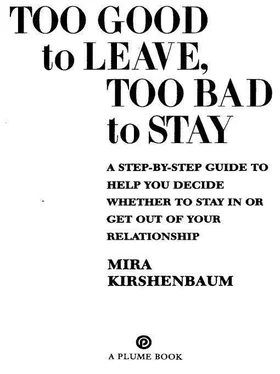Kirshenbaum, Mira - Too Good to Leave, Too Bad to Stay
Здесь есть возможность читать онлайн «Kirshenbaum, Mira - Too Good to Leave, Too Bad to Stay» весь текст электронной книги совершенно бесплатно (целиком полную версию без сокращений). В некоторых случаях можно слушать аудио, скачать через торрент в формате fb2 и присутствует краткое содержание. Жанр: Психология. Описание произведения, (предисловие) а так же отзывы посетителей доступны на портале библиотеки ЛибКат.
- Название:Too Good to Leave, Too Bad to Stay
- Автор:
- Жанр:
- Год:неизвестен
- ISBN:нет данных
- Рейтинг книги:3 / 5. Голосов: 1
-
Избранное:Добавить в избранное
- Отзывы:
-
Ваша оценка:
- 60
- 1
- 2
- 3
- 4
- 5
Too Good to Leave, Too Bad to Stay: краткое содержание, описание и аннотация
Предлагаем к чтению аннотацию, описание, краткое содержание или предисловие (зависит от того, что написал сам автор книги «Too Good to Leave, Too Bad to Stay»). Если вы не нашли необходимую информацию о книге — напишите в комментариях, мы постараемся отыскать её.
Too Good to Leave, Too Bad to Stay — читать онлайн бесплатно полную книгу (весь текст) целиком
Ниже представлен текст книги, разбитый по страницам. Система сохранения места последней прочитанной страницы, позволяет с удобством читать онлайн бесплатно книгу «Too Good to Leave, Too Bad to Stay», без необходимости каждый раз заново искать на чём Вы остановились. Поставьте закладку, и сможете в любой момент перейти на страницу, на которой закончили чтение.
Интервал:
Закладка:
Please don’t get the wrong impression. In spite of all this talk about disrespect, there’s also a lot of respect in the average relationship. Maybe no man is a hero to his valet, but in most relationships there are surprisingly strong currents of respect and even admiration. So I don’t want to disrespect the average relationship by overemphasizing how much disrespect there is in it. But you have to have respect for all the forces that constantly work to produce disrespect and for our own ability to overcome these forces. Sometimes we do overcome them. But sometimes they overcome us, and that’s when we have to worry about relationships getting too bad to stay in.
STEP #25: THE ATMOSPHERE OF RESPECT
The realm of respect is where lots of people need help drawing the line. Let’s go back to our pollution example. One reason you might stop drinking the water from your reservoir is that it was toxic, that you were afraid it would actually hurt you. We’ve dealt with that, when it comes to disrespect, in guideline #24.
But there’s another reason why you might stop drinking the water. Maybe you know for sure there’s no way it can hurt you, but suppose every time you look at a glass of water it looks so unclear, and every time you smell it there’s an odor of something that doesn’t appeal to you. When do you sign up for expensive home delivery of spring water? Where do you draw the line?
It’s like this for a lot of people in their relationships when it comes to disrespect. There’s no danger of their actually being hurt by all the disrespectful things their partner says. But there’s still an endless barrage of putdowns and criticisms and patronizing questions and demeaning comparisons and seemingly “helpful feedback” that’s really just a polite excuse for your partner to express disappointment, dismissal, and disgust.
Where do you draw the line? This question will help:
Diagnostic question #25. As you think about your partner’s disrespect, is it clear to you that you do everything possible to limit your contact with your partner, except for times where you absolutely must interact?
This question points to the issue that’s proved essential for people trying to determine when their partner’s disrespect has crossed the line from being annoying to being impossible. But why do we need this question at all? You’re not stupid. You’d know when water was too bad tasting to drink. Why wouldn’t you know when enough is enough when it comes to living in an atmosphere polluted by disrespect? You get sick of it and then you leave, right? So why is drawing the line like this hard for some people?
A constant atmosphere of disrespect, in terms of its psychological effects, has some of the same ingredients as childhood abuse. Some of the same psychological factors that make it hard for children to see what’s happening to them make it hard for you to see what’s happening to you. Let me tell you about Hank.
Hank’s Story
It was one of those classic, tragic cases of childhood sexual abuse. To put a lot of pain in one small nutshell, Hank had an uncle who forced him to have sex almost monthly for a five-year period between the time when Hank was nine and fourteen.
A question that plagued Hank for years after this whole experience came out in the open was why he’d put up with it. Sure he was a little boy, but he wasn’t that little and he wasn’t that powerless. Hank was haunted by his inability to have drawn a line in the sand.
Through therapy, Hank learned to be more understanding and forgiving of himself. He got some insight into how these things work psychologically. Why don’t children who are subjected to this kind of abuse try to stop it even when they’re not terrorized into keeping silent? There are four main reasons:
1. Children get used to this happening, particularly when it starts at an early enough age. It’s bad, but it soon becomes a regular part of their lives. And regularity creates a false sense of normality. This false sense of normality can paradoxically coexist with a sense of horror.
2. Children mistakenly believe there’s some validity to what’s happening. Children who are physically abused are led to believe they’re bad. Children who are sexually abused are often led to believe they’re sexy, seductive tempters.
3. Children employ the classic psychological technique of dissociation, where they distance themselves from their own emotions as a way of coping with the bad things that are happening to them. They train themselves to stop feeling what they’re feeling.
4. Children find it so impossible to imagine that a parent or grandparent or an aunt or uncle would do something like this to them that, even though they know what’s happening when it’s happening, they’re somehow able to deny that it’s been happening the rest of the time.
I’m not saying that all these things happen for all abused kids all the time. But they’re extremely common, even normal, responses to this kind of abnormal experience.
During the period Hank came to understand this, he became aware that his partner was continuously and intensively assaulting him with a barrage of disrespect. From some inner resource, Hank was able to avoid coming to believe that the things his partner was saying about him were true. So guideline #24 didn’t apply. At the same time, he was shocked that he was putting up with all of this verbal abuse at all. Why would he live with it and not leave?
Then it hit him. The identical four reasons that explained why he’d been unable to try to stop his sexual abuse as a child were operating right now with his partner’s verbal abuse.
1. He’d gotten used to it, so it seemed normal to him.
2. While Hank didn’t believe the details of his partner’s putdowns, he did believe in a general way that he needed “improving,” and so there seemed to be validity in his being put down.
3. Hank put up an inner barrier that allowed him to not seem to experience the feelings his partner’s putdowns must have been stimulating in him.
4. And because he couldn’t imagine that the person he wanted to love him would feel so little respect toward him, he was able to deny that the disrespect was happening at all.
These are the four things that you have to learn to see past if you’re going to be able to draw a line when it comes to disrespect. Have you simply gotten used to it? Do you believe it’s justified? Have you prevented yourself from feeling the impact of these putdowns? Do you not believe that your partner could be putting you down this way?
Now you’re ready for the guideline:
GUIDELINE #25
If your partner is all too often all too disrespectful to you and you realize that you do everything possible to limit your contact with your partner, except for those times where you absolutely must interact, then the level of disrespect has spoiled the atmosphere of your relationship and you’ll be happy if you leave. Quick take: The water’s too bad to drink when you find you’ve stopped drinking the water.
Avoidance and distance are the measure of a level of disrespect that, even though it’s nontoxic, is too unpleasant for you to have to put up with.
It’s important to understand that your doing “everything possible to limit your contact with your partner” goes far beyond physical avoidance:
• Every time you think about something and it occurs to you to share your thought with your partner and you don‘t, you’re limiting your contact with him.
• Every time you want to ask her a question and you don’t, you’re limiting your contact with her.
• Every time you want to tell him about some small triumph or disaster in your life and you stay silent, you’re limiting your contact with him.
Читать дальшеИнтервал:
Закладка:
Похожие книги на «Too Good to Leave, Too Bad to Stay»
Представляем Вашему вниманию похожие книги на «Too Good to Leave, Too Bad to Stay» списком для выбора. Мы отобрали схожую по названию и смыслу литературу в надежде предоставить читателям больше вариантов отыскать новые, интересные, ещё непрочитанные произведения.
Обсуждение, отзывы о книге «Too Good to Leave, Too Bad to Stay» и просто собственные мнения читателей. Оставьте ваши комментарии, напишите, что Вы думаете о произведении, его смысле или главных героях. Укажите что конкретно понравилось, а что нет, и почему Вы так считаете.












